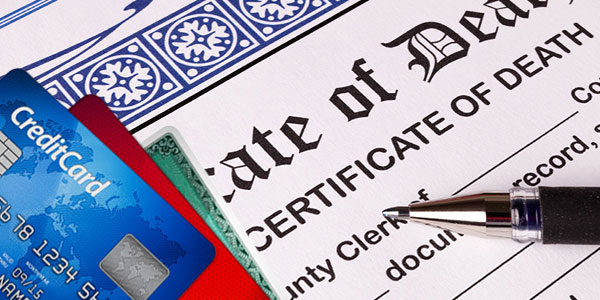Does your credit card debt die with you? Does it enter your grave stealthily? Or, does it haunt your family?
There is no simple answer to this question since lots of factors can change a scenario.
(i) Your location
(ii) The name of the credit card holder
(i) The location:
Location matters especially in the case of community property states (Idaho, Wisconsin, Nevada, Arizona, California, Washington, New Mexico, Louisiana, etc) where debts and assets accumulated after marriage are considered as joint properties. So, if a wife has a separate credit card account and incurs debt, then after her death, the debt may pass to the husband. But the law is not always rigid and same in all the community property states. Naturally, you need to ask a lot of questions in these states.
(ii) The name of the credit card holder:
If the card is only yours, then your family is saved. Creditors won’t run after your family members. Your estate would be held responsible for paying off the debt. In case, the estate goes through probate, your executor will determine which bills need to be paid first as per the state laws. The rest of your assets will be distributed amongst your heirs as per your will or state laws.
If the estate is insolvent, then creditors would get nothing. They would simply write off the debts and that’s it. Family or children won’t inherit debt. Credit card companies can’t compel family or children to settle the debt.
Now, let’s talk us about the second scenario - you have a joint credit card. In this scenario, the other/joint/ cardholder will be responsible for paying or settling the outstanding balance along with the estate. If there is a cosigner, then he/she will also be responsible for clearing the debt.
What about the authorized user
Authorized users are not responsible for settling credit card debts. They didn’t sign the credit card application. All they’re doing is charging privileges.
How to handle the debt collectors
- Do I owe the debt and need to settle it?
- Has the debt crossed the SOL period?
- Is the debt legit?
Please accept whatever creditors or debt collectors tell you. Debt collectors will tell you lots of stories. Don’t believe them. I’ll tell you why.
In 2016, my cousin sister Norah lost her husband Patrick in an accident. Pat died with $12000 on a credit card. Norah continued to make payments for the first few months, especially when the estate was being settled. She was only the authorized user of the credit card. So, when the estate didn’t have any money, she didn’t pay a penny to the debt collector and that is when the trouble began.
Debt collectors kept calling her. In fact, they even reported the debt on her credit report. She said several times that she was only the authorized user but the debt collectors refused to listen to her. In fact, they went ahead and filed a lawsuit against her. With no option left in her hand, Norah approached an attorney and explained the entire situation. The attorney sent a letter to the collection agency with proper documents to prove that Norah was only an authorized user of the card. The collection agency revoked the lawsuit.
Debt collectors don’t hesitate to lie or cheat. All they want is money. But, this doesn’t mean debt collectors can collect.
If you check out OVLG Answers, you’ll come to know that many debtors are harassed by debt collectors every day. Debt collectors use inventive things to harass debtors and collect money from them. If you’re being harassed by collectors, then don’t pay them a penny. Rather, share your problem in OVLG Answers. Hopefully, our experts can show you the right direction.
What are your roles and responsibilities?
When your parents or spouse dies, the executor would inform creditors. Contact each creditor if you’re handling the duty yourself and inform that the account holder is dead. Get the contact details of creditors and mail a certified copy of the death certificate of the deceased account holder. Keep all the documents with yourself.
Don’t make payments until you have a complete idea of the debts and assets. If creditors ask you about making payments, then refer them to the executor.













